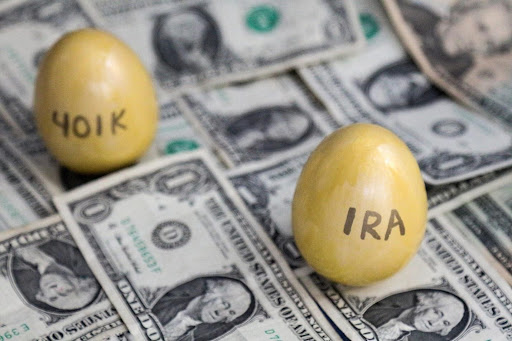Having a secure career is neat, but having a secure retirement is even better. Think about it: people change jobs, move places, get fired, get promoted: there’s simply no 100% guarantee what tomorrow will bring for you professionally. However, one thing is certain: if you invest in your future after retirement, with a clearly defined strategy and a diverse portfolio, then you’ll surely enjoy the comfort you deserve after a lasting career.
To make this happen, you’ll need to dig deeper into the available options and see what each has to offer. This article will deal with the 401k plan and Gold IRAs specifically, and comparing the two will hopefully help you achieve a better understanding of the investment game. It’s necessary to follow the markets and trends so you can keep afloat in these restless waters. Click here to find out more.
Getting Familiar with 401(k)
This retirement plan is the usual choice for people in the US. Employees save money through pre-tax contributions, and the sponsorship falls on the employer. Some companies offer the 401(k) plan, while others don’t, depending on their policies.
If you opt for this arrangement, you can defer your payments to the 401(k) account and save them for the future. Until you choose to withdraw, these assets remain nontaxable. It has proven beneficial for employers who struggled with various pension plans in the past; it allows workers to take the reins and manage their accounts by deciding how much they will put aside.
It’s important to note that the federal law protects employees’ retirement schemes by establishing a minimum standard. This comes in very handy when your plan is compromised in any way; under legal protection, you have the right to sue. Also, you can launch an appeal if you think there’s a possibility of losing your benefits.
We already mentioned that your earnings would not be taxed until you withdraw, clearly a huge advantage. In other words, the assets in a 401(k) account are tax-deferred. You can visit https://www.consumeraffairs.com/finance/what-is-a-gold-ira.html for more information. Still, you have to pay taxes for Medicare and Social Security, otherwise known as FICA taxes.
Yet another great advantage of this plan is the high contribution limit. It has been significantly increased in the past few years, especially for people over 50. Generally, financial experts agree that putting at least 10% of your income in the retirement account is best. You can also contribute through percentages until you reach the annual limit.
Finally, the 401(k) plan is regarded as a highly effective shield against creditors, qualified by the ERISA (Employee Retirement Income Security Act.) That is to say – creditors cannot seize your retirement savings in any way. There are certain exceptions: if you go to prison for committing a crime, the state could use your savings for compensation. Also, if the creditor is IRS or your former spouse, protection goes out the window.
Reasons to Invest in Gold
Besides the 401(k) plan, another popular investment plan for employees is the precious metal IRA. You don’t have to be an economic expert to know about the value of gold, silver, platinum, palladium, and other highly revered physical assets. Because of their currency status, the IRS lets you diversify your retirement portfolio by using bullion as a means of financial security for the future.
However, it’s impossible to purchase physical gold using traditional accounts available in most banks and brokerages: it requires knowledge of 401K investing and a self-directed Gold IRA. Apart from precious metals, you can go for other alternative investments, such as real estate, mortgages, digital assets, intellectual property, etc. However, many choose gold for several different reasons.
The rich and illustrious history of this metal has made it synonymous with wealth. Its role in jewelry, for instance, is enough to show just prized the yellow metal is around the globe. Apart from that, It managed to preserve its value through the ages. We cannot say the same for paper currency, which is always affected by the economy and market trends.
Let’s take the US dollar as an example. Whenever there are deficits in budget and trade, an increase of the national debt, or some other important factor, the dollars weakens. So, you can see how monetary policies directly affect such a vital currency every single day. These instabilities frighten citizens, making them insecure about their retirement, so naturally, they choose to rely on a far more stable asset such as gold.
So, while other assets, such as stocks and bonds, are risky and volatile, metals are there to provide security and create a necessary balance in your portfolio. Investors often fear that they might lose the savings they worked hard for, so they’ll add precious metals to the account to get that peace of mind about their retirement days.
One simple rule of thumb in finances goes as follows: when the cost of living goes up, so does the price of gold. This is precisely why it’s considered an effective hedging solution against inflation. In periods of high inflation, the stock market plummets, while gold does the exact opposite. It’s an excellent means of protection against market cycles. Click on this link for more info.
Purchasing Gold with 401(k)

If you’re wondering whether buying bullion using your 401(k) plan is possible, the answer is probably no. In fact, most of these plans don’t allow direct investments in gold. However, that doesn’t mean all doors are closed: quite the contrary. You can always turn to ETFs (exchanged-traded funds) or mutual funds to get those precious coins and bars into a vault.
If you think that someday you might try surfing on the gold wave, but you’re not sure at the moment, it’s best to choose a 401(k) with a brokerage option and use its benefits in the future. Essentially, it gives you the freedom to invest in a vast range of assets, gold included. One way to do it is through ETFs, a simple and cheap way of investing in a gold-holding fund.
An alternative to ETFs is to use mutual funds and buy “paper gold”, as some experts call it. Namely, companies who deal with gold mining can help you get your bullion through mutual funds provided in your existing 401(k) plan (if there’s any). They are electronic, so you’re not obliged to store physical assets, making mutual funds a highly convenient solution.
Rolling It Over
Funds are not the only way to fulfill your gold investment goals. If you’re limited by your 401(k), here’s some excellent news: you can switch (roll over) over your 401(k) into a Gold IRA. This way, you get way more freedom to choose from a variety of assets.
Let’s say you decide to quit your job, or you finally reached retirement age. This is the ideal time for an IRA rollover, where you obtain your 401(k) money from your employer through an in-service withdrawal. There are some pros and cons to this solution, and it’s up to you to weigh the options and see if it suits you. You can go to https://www.investing.com/news/commodities-news/gold-down-as-dollar-strengthens-but-continuous-inflation-concerns-cap-losses-2634611 to get more insight.
First of all, a rollover into a Gold IRA allows you greater control. As we already mentioned, one advantage is the sheer range of investment options that don’t come with the limited 401(k) accounts. Next, you get to choose the service provider, i.e., the investment platform.
The obvious choice, of course, would be a company with excellent, readily available customer support that will direct you through every stage of the procedure. Also, a gold-backed account saves you money by reducing the fees significantly, plus it allows easy access to your assets.
Now, it wouldn’t be fair to single out only the good stuff, so let’s examine briefly a few potentially problematic things. Generally, 401(k)s are protected better by law (the ERISA we discussed earlier.) Civil cases, creditors, even bankruptcy – you don’t have to worry about any of that. That doesn’t mean that IRAs are unsafe – US laws say that creditors can’t touch your self-directed accounts as well. Also, it’s somewhat easier to cash out from a 401(k), as well as to mix job plans with it.
Final Thoughts
The question that arises after inspecting this matter in detail is: should you do a rollover? If you plan on expanding your options and using the many advantages of a Gold IRA, then it’s a resounding yes. And even after you’ve done it, you can still open a brand-new 401(k) if you want. The future is in your hands, so why not try to make the most out of your resources?


